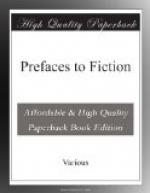The assumption that the new prose fiction could be judged, as the Scuderys professed to judge their work, first of all by reference to the rules of heroic poetry is frequent in the next century—in the unlikely Mrs. Davys (preface, Works, 1725); in Joseph Andrews of course, where the rules of the serious epic and of the heroic romance are to aid the author in copying the ancient but, as it happens, nonexistent comic epic; and in Fielding’s preface to his sister’s David Simple (1744). Both Richardson and Fielding were attacked on epic grounds.[4] Dr. Johnson’s interesting and unfriendly essay on recent prose fiction (Rambler No. 4) adopted the terminology familiar in the criticism of epic and romance and showed that Johnson, unlike d’Argens and Fielding, did not intend to give any of the old doctrines new meanings in a way to justify realism. Johnson laughed a little in that essay at the heroic romances; but like Mlle. de Scudery, whose Conversations he drew on for a footnote in his edition of Shakespeare (1765),[5] he believed that fiction should be “probable” and yet should idealize life and men and observe poetic Justice. Many other writers on prose fiction borrowed the old neo-classic rules, and they applied them often so carelessly and so insincerely that one is glad to come eventually on signs of rebellion, even if from the sentimentalists: “I know not,” wrote Elizabeth Griffith in the preface to The Delicate Distress (1769), “whether novel, like the epopee, has any rules, peculiar to itself.... Sensibility is, in my mind, as necessary, as taste, to intitle us to judge of a work, like this.”
The theory of prose fiction offered by the Scuderys was, on the whole, better than their practice. The same remark can be made with even greater assurance of The Secret History of Queen Zarah, and the Zarazians (1705) and the other political-scandalous “histories” of Mary De la Riviere Manley. For in spite of the faults of Queen Zarah, the preface is one of the most substantial discussions of prose fiction in the century. Boldly and reasonably it repudiates the most characteristic features of the heroic romance—the vastness produced by intercalated stories; the idealized characters, almost “exempted from all the Weakness of Humane Nature;” the marvelous adventures and remote settings; the essay-like conversations; the adulatory attitude; and poetic Justice. Vraisemblance and decorum, we are told, are still obligatory, but the probable character, action, dialogue will now be less prodigious, will be closer to real life as the modern English reader knows it. Thus Mrs. Manley announced a point of view which was, at least in most respects, to dominate the theory and invigorate the practice of prose fiction throughout the century.




